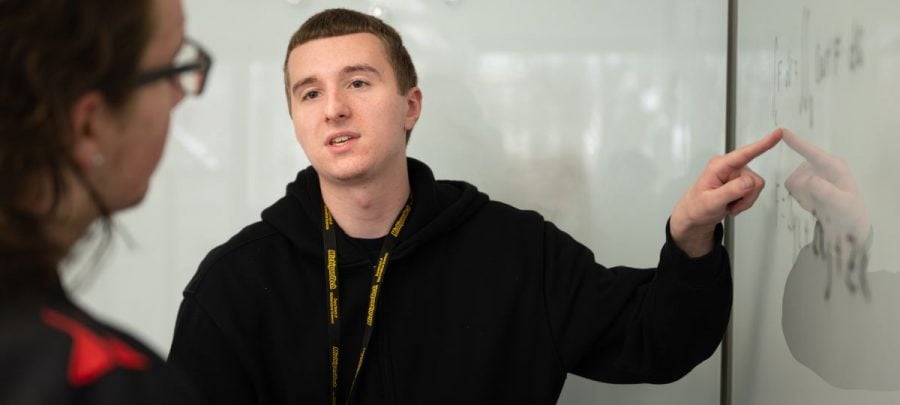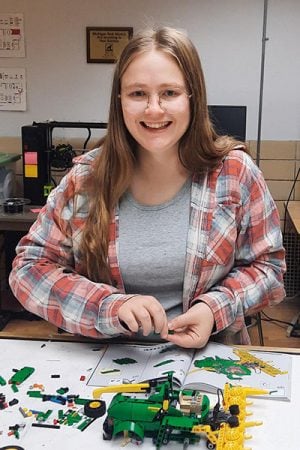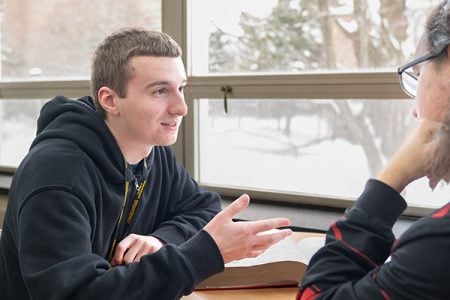
Discrete mathematics student McCoy Ziehl and fellow Michigan Tech Class of 2025 member Emily Ruf, who is double-majoring in statistics and discrete mathematics, share an inside look at what MTU math majors do in and out of the classroom.
On any given day these curious problem solvers may delve deep into the mysteries of mathematics, ice skate on a frozen canal, build Legos, and attend soup parties. Sometimes all of the above.
In this Michigan Tech Math Q&A, we asked Ziehl and Ruf some of the same questions about life as a math student at Tech, and got unique takes on their individual interests.
Q: What is it like being a math major at a university traditionally known for engineering?
MZ: I personally like it. I like being in that smaller group where I can get to know the people in my major. It’s especially nice to get to know the faculty because things like getting on the outreach team happen—and faculty asking me if I want to be a course-grader happens. There are a lot more specific opportunities here.
ER: Engineering and math are connected, especially statistics. A lot of computer science overlaps with statistics and it’s still a STEM major so it fits in with the engineering and computer science stuff very well. There are similar required classes.
Q: How do you find a sense of community on campus?
MZ: In those upper-level classes that are specific to your concentration there might be 10 people or less registered for your class. A class I took last semester had four people in it, and the person I sat next to in that class sat next to me in another very specific high-level class. That person was Emily Ruf, and this past weekend I went to her soup party. So, I guess one advantage of being a math major is that you get to eat soup.
ER: I met a lot of my friends in the Pavlis Honors College but I do know a lot of the other math majors. In your first year you take a class with all of the other freshman math majors. The course title varies; for my year it was called Exploring Knots and Surfaces. You do proofs and you learn about mathematical thinking but you also do a lot of talking with the other math majors. So, I think I know everybody’s name from that, at least the students in my year.
“I think it’s easy to get to know people at Michigan Tech. When you’re walking through campus you have to keep looking around and making eye contact with people and giving them a smile because you know so many people. It’s nice.”
Q: Why did you choose math?
MZ: That’s a question I get a lot. I’ve always liked math. When I was 10 and people asked me what my favorite subject was I’d say ‘math’ and other people my age would look at me like I was crazy. I thought that someday math going to get hard and I would stop liking itt, but that didn’t happen. I just kept liking it.
I actually started at Tech as a computer science major, but I was taking math classes and trying to figure out how many math classes I could fit into my schedule and still graduate with a computer science degree. I thought maybe I should switch, be a math major and get a minor in computer science. So that’s what I ended up doing.
ER: I was into math in high school, I did AP calc and statistics. The reason I stuck with it is because I discovered that math, especially statistics, is a communication tool. There’s all this raw information in the world, tons and tons of raw information, and if a person who didn’t have any statistical knowledge looked at it they wouldn’t be able to draw conclusions or make decisions. A lot of statistics is a communication tool where you are translating random numbers into something actionable that people can actually work with and understand.
“Michigan Tech math students are people who are interested in solving problems, who have a lot of curiosity. I feel like the math major is a very problem-solving or logic-type major. That’s really the skill you are building.”
Q: What does an average day or week in the life of a math student look like?
MZ: This might not sound very appealing but, lots of homework. It can be a lot of work to be a math major, but the reason people choose it is because they like math. So they don’t mind as much if that’s where a lot of their free time is going. I know a lot of people who will transition from studying the material in a class to some tangent they found when they were researching it. So their free time is spent doing a little bit more than what was expected from the class.
I’m in the orchestra, so that’s another thing that I do usually a couple of times a week—I usually have rehearsal on Tuesdays and at least one practice. There is a math professor in the orchestra but I think I may be the only math major in the orchestra. I know at least one math major who does sports. One of my friends is in a fraternity. A lot of what we do is math, though.
ER: An average day over the last few semesters is probably about three classes and then a lot of studying and working on homework in the afternoon and evening. My first three years I was in student government. I’m the president of the Husky Amateur Lego Organization. That’s really just one day a week, and then I like to cook and have dinner parties at my house. I go to church at Grace United Methodist Church.
McCoy Ziehl: Finding Community through Work, Teaching and Learning
Q: What kind of work do you do?
MZ: I work at the Math Learning Center, which is a great opportunity for math majors. A lot of the people who work there are not actually math majors—but the math majors have a more interesting perspective because they can usually explain a little bit better why things are happening, whereas the non-math majors just know how to do it.
I also work as a course grader. Most students take at least one math class, so if you’re from the smaller group of math students able to grade for those courses then it is a pretty easy job to get.
Q: McCoy, what goes on in the Math Learning Center?
MZ: On weekdays, any student can walk in with questions. A lot of the questions we answer address the kinds of mathematics engineers and computer scientists are taking: calculus, differential equations, linear algebra. If you want a more specialized session you can make an appointment.
The math learning center is a really great environment for doing math. There are interactions between coaches helping each other out. At least one of my friends is doing an appointment at the Math Learning Center, even though he works there. I’m in a math class right now with three other people I work with. If I’m stuck on a problemI can go into the Center and ask for their help and vice versa. We work on things together if we happen to be there.
Communities form when students who are in the same class go to the Math Learning Center. I notice that people get to know each other, especially at our tables for Calc II and III, because they are getting ready for the same exams and doing the same homework assignments. They tend to talk to each other a lot and I feel like they form their own little cultures.
Q: How did you get involved with course grading?
MZ: The first time was through the Math Learning Center. The instructor who needed a course grader reached out to the learning center director, who then sent an email out to all coaches asking if anyone was interested. I’ve done it two other times since then and it’s always something different that gets me involved. The second time an email was sent to all math majors and I guess I was the first to respond. The third time was the coolest for me because the professor reached out to me personally as someone who had done well in his class.

(Image courtesy of Emily Ruf)
Emily Ruf: Cooking up Connections with Legos, Food, and Faith
Q: How did you get involved in Lego Club?
ER: When I was in Undergraduate Student Government I was involved in student organization finance. At first I was on the ways and means committee and then I was the treasurer so I chaired the ways and means committee. I became really interested in learning about all the super-diverse clubs they have at Michigan Tech. I really wanted to start one myself. I thought, “There’s no Lego club and it would be really cool if we could give more people access to Legos with help from student activity funds.”
The biggest problem with Legos is that they’re really expensive. So we started a Lego club. It’s almost like a library; we have a bunch of Legos, we all take turns building them, and then we take them apart . It makes building Legos a lot cheaper. The first few years I was the treasurer and now I’m the president.
Q: What do you like to cook?
ER: I cook a little bit of everything. I try to make new recipes. I live with 11 other people and we plan a different menu every week. I try to get different varieties of food and make different things. I also love to cook food for dinner parties we host at my house like Easter and my annual soup party. I’ve recently been trying to make some TikTok recipes and YouTube short recipes and it has not been going well. For one thing, videos that are a quick recipe for one person are not always super scaleable. I tend to think I can make it for that many people but, no, I can’t!
Q: How did you get involved with Grace United Methodist Church?
ER: That’s kind of funny. The summer after freshman year I worked at a summer camp which made me want to check out some of the different churches in Houghton.
So every Sunday for a whole semester I attended a different church. I went to almost every church in Houghton and decided Grace United Methodist was really cool. There are a lot of different ages of people and they blend a lot of the traditional and contemporary together. I think it’s a really nice church.
Q: Outside of classes, studying, and campus activities what do you and your friends do for fun?
ER: The big thing at Michigan Tech is going outside. When it’s fall and nice out we’ll go hiking or to explore some of the mining era relics like the stamp mills. In the winter it’s really fun to do night activities so we’ll go do a bonfire at the beach or go stargazing.
The snow is really nice. I like sledding and broomball. I’ve been on the same broomball team all four years. It was my hall team originally and then we kept it going with my friends from the hall who still wanted to be on it. I’ve been ice skating outdoors if the weather permits. I skated on the Portage Canal last winter which was cool. It was pretty solidly frozen, I wouldn’t do it if it was sketchy. I went to open skate here at Tech my freshman year and thought it was really fun. Later, I got my own skates and did the beginning skating class. I’m going to do the intermediate skating class next semester.
Q: How do your two majors, discrete mathematics and statistics, work together? Why did you choose those two majors?
ER: The math major is pretty flexible. You have to pick a concentration at the beginning, but you have enough room in your schedule to do multiple things. So I started with discrete math and then I became a lot more interested in statistics. I had plenty of room in my schedule to add the statistics major, but I thought I might as well finish discrete math.
In your statistics class you’re dealing with specific mathematical objects and processes that you’re going to carry out with them. It’s really applied. In discrete math, you learn that an object isn’t unique, it is part of a collection of objects that are just like it. You can see how all these different mathematical concepts are connected by a central system of rules.
There’s all this stuff in the world I’ve always been curious about. One of the coolest classes I took in discrete math was cryptography. I also took a class that is kind of similar: coding theory. It is all about how information is encrypted or encoded. It really tells you a lot of stuff you wouldn’t normally know about how computers and information work.
About the College of Sciences and Arts
The College of Sciences and Arts is a global center of academic excellence in the sciences, humanities, and arts for a technological world. Our teacher-scholar model is a foundation for experiential learning, innovative research and scholarship, and civic leadership. The College offers 33 bachelor’s degrees in biological sciences, chemistry, humanities, kinesiology and Integrative physiology, mathematical sciences, physics, psychology and human factors, social sciences, and visual and performing arts. We are home to Michigan Tech’s pre-health professions and ROTC programs. The College offers 24 graduate degrees and certificates. We conduct approximately $12 million in externally funded research in health and wellness, sustainability and resiliency, and the human-technology frontier.
Follow the College on Facebook, Instagram, LinkedIn, X and the CSA blog. Questions? Contact us at csa@mtu.edu.
